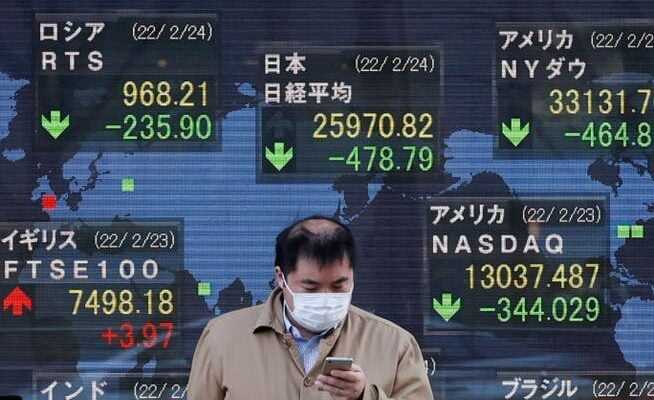The Ukraine war and the sanctions against Russia are increasing concerns about the global economy. However, oil and materials companies are benefiting from rising commodity prices.
In Tokyo, the stock exchange followed the downturn on European and American markets. (photo dated 2/24/22)
Stock exchanges in Asia continued the downturn in European and American markets on Wednesday morning. The region’s most liquid market, the Tokyo Stock Exchange, gave back yesterday’s gains. The Nikkei 225 index, which includes 225 large companies, fell 1.9 percent to 26,341.95 points by the lunch break, while the more broadly weighted Topix index fell 1.8 percent to 1,863.47 points.
This trend was also repeated in Shanghai, Hong Kong and Singapore, where the indices started the day with losses after a slight recovery the previous day. The outlier was the Seoul Stock Exchange, which missed early Tuesday’s sprint in Asia due to a public holiday. South Korea’s Kospi instead oscillated around Monday’s closing price.
In Japan, however, it was noted positively that there was no broad slide in prices, although concerns about the global economic consequences of the Ukraine war and the international sanctions against Russia are increasing. However, fears of a crisis were reflected in the above-average losses of companies such as automakers, which are heavily dependent on global demand.
Toyota slipped temporarily by 3.2 percent in the first hour of trading, Honda even by 3.9 percent. The banks also lost significantly, as did factory suppliers such as the industrial robot manufacturer Fanuc, which had risen significantly on Tuesday.
On the other hand, commodity-dependent stocks such as steelmakers, material suppliers and some oil companies rose after yesterday’s rise in many commodity prices in the hope that they could pass on higher costs to their customers and increase their profits.
A good example of a crisis winner is Japan’s oil company Inpex. Since its value fell to its lowest level in more than ten years in October 2020, the share price has almost tripled. On Wednesday alone, the price jumped seven percent to 1,306 yen in the first 90 minutes of trading. This is the highest value since the end of 2018.
Oil and gold prices are rising sharply, bond yields are falling
The outlook for the commodities industry remains bright, dragging Asian markets along with Europe and the US’s price hikes on Wednesday. The spot price for crude oil from Dubai broke through the $100 a barrel mark and rose by $8.40 to $105.30.
The release of 60 million barrels of oil reserves, which the members of the International Energy Agency had decided on Tuesday, fizzled out. Because the dealers are betting that the additional quantities will not be sufficient to break the price trend.
The gold price in Japan also rose for the first time in four trading days and rose by 1.5 percent to 7,148 yen (55.84 euros) per gram in the first two hours of trading. Platinum was also more than one percent more expensive. Because the speculators are betting that the demand for platinum, for example for car catalytic converters, will increase due to a possible supply failure of Russian palladium.
Japan’s bonds also followed Wall Street’s movement. The yield on ten-year Japanese government bonds fell by 0.04 percentage points to 0.135 percent. This is the lowest value in more than a month.
The currency markets continue to react calmly
While the stock, bond and commodity markets fluctuate, the foreign exchange market remains largely stable. The euro fell against the yen by almost one percent to just under 128 yen. But the dollar was trading at 115 yen, about the same level as the previous day, while the franc, Australian dollar and sterling gained modestly against the yen. But the Chief Investment Office of Global Wealth Management at the big bank UBS warns its customers in an analysis not to rely on it. “The absence of a clear trend in FX markets is unlikely to last long.”
